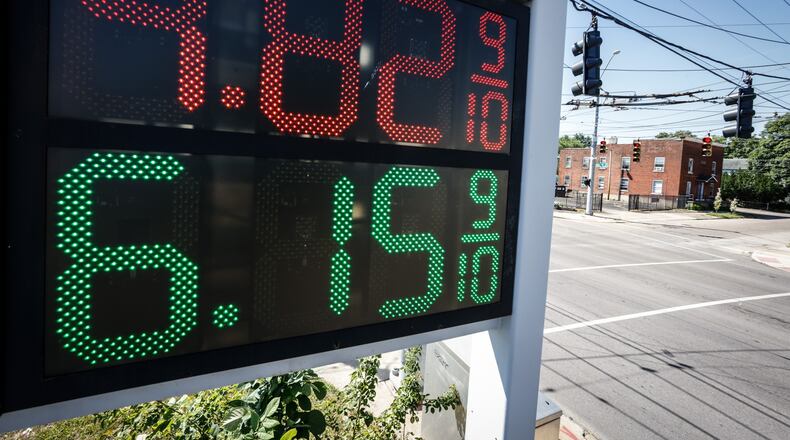A decrease in the global price of oil from about $123 a barrel at its peak earlier this month to about $107 a barrel on Monday was a “nice drop” that has helped the national average for a gallon of gas to fall for a second week, according to Patrick De Haan, GasBuddy’s head of petroleum analysis.
“Unless there’s a drastic change, we could see prices go down, another 15- to 35-cent drop over the next couple of weeks in Dayton,” he said. “Dayton tends to be a pretty price-aggressive (market).”
Some of the supply-side issues that caused prices to jump beyond $5 in the Great Lakes states of Michigan, Indiana, Ohio and Illinois have started to improve, De Haan said.
“There was extremely tight supply in the Great Lakes, and it has started to now pick back up,” he said. “Gasoline inventories in the Midwest have started to improve. Along with that, we’ve seen refinery utilization start going up. We’ve also (received) supply from the Gulf Coast.”
Change in gas prices
| U.S. | Ohio | Dayton | Springfield | Cincinnati | |
|---|---|---|---|---|---|
| Monday's average | $4.90 | $4.87 | $4.88 | $4.88 | $4.95 |
| Sunday's average | $4.90 | $4.88 | $4.90 | $4.88 | $4.95 |
| Average as of a week ago | $4.98 | $4.98 | $5.00 | $4.96 | $5.03 |
| Average as of a month ago | $4.60 | $4.44 | $4.43 | $4.38 | $4.46 |
| Average as of a year ago | $3.10 | $2.97 | $2.95 | $2.95 | $2.99 |
The same drop in prices experienced locally is being felt on the state and national level. In Ohio, prices Monday were down to $4.87, an 11-cent drop from a week ago, according to AAA. Today’s national average of $4.90 is eight cents less than a week ago and 30 cents more than a month ago, but still a whopping $1.80 more than a year ago.
The average price for a gallon of gas is expected to decline 10 cents and maybe as much as 20 cents by Independence Day on on July 4, but “there’s a lot of volatility in the market” so prices could change beyond where they are predicted, De Haan said.
“Motorists should be wary that while the decline could continue for the week ahead, any sudden jolts to supply could quickly cause a turnaround, and risk remains that when the peak of hurricane season arrives, we could see a super spike at the pump,” De Haan said.
The drop in the price per barrel of oil was the result of economic fears of a potential global recession leading to less demand for oil, according to AAA.
“Fear is not a good reason to move a market like the one for oil, but it is a powerful motivator,” AAA spokesman Andrew Gross said Monday. “The cost of oil accounts for nearly $3 for every $4.89 at the gas pump. Consumers should find more relief when fueling up if oil prices drop further.”
The nation’s top 10 largest weekly decreases included Florida (-15 cents), Wisconsin and Delaware (-13 cents), Indiana (-12 cents), and then South Carolina, Ohio, Kentucky, Texas, Washington, D.C. and Michigan (-11 cents each), according to AAA.
Despite the recent drop in gas prices, this Independence Day will see the highest gas prices ever for that holiday. Prices for a gallon of unleaded are still 45 cents higher per gallon than a month ago in the Dayton area, 50 cents higher in the Springfield area and 49 cents higher in the Cincinnati area, according to AAA.
Relief from pain at the pump could come via temporarily waiving the federal gas tax, something President Joe Biden proposed last Wednesday. But first, Congress would need to approve the measure and politicians on both sides of the aisle have made it “less than clear” that that will happen, De Haan said.
“If it does, that could basically save everyone close to 18 cents a gallon,” he said. “Now, that does depend on how the law is worded. Keep in mind that stations have thousands of gallons of gasoline they have in their underground storage tanks, so when that law comes into effect, the biggest question is will the government make them sell through that inventory that they bought at a higher price. That could cause any pass through to be a little bit slower.”
Alternatively, stations could get retroactive relief, with the government saying “even those gallons you already bought, we’ll give you a refund for,” De Haan said.
“If that is the case, then the decline could be more rapid,” he said.
Credit: Bill Lackey
Credit: Bill Lackey
About the Author



